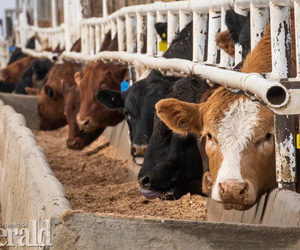COVID-19 having an impact on local agriculture industry
By Lethbridge Herald on April 15, 2020.
 Cattle line a trough Wednesday at an area feedlot, as the COVID-19 outbreak begins to have some significant impacts on agriculture in southern Alberta. Herald photo by Ian Martens @IMartensHerald
Cattle line a trough Wednesday at an area feedlot, as the COVID-19 outbreak begins to have some significant impacts on agriculture in southern Alberta. Herald photo by Ian Martens @IMartensHeraldTim Kalinowski
Lethbridge Herald
tkalinowski@lethbridgeherald.com
The COVID-19 outbreak is starting to have some significant impacts on agriculture in southern Alberta, particularly on the potato industry and on the cattle-feeding side of things as food processing facilities cut back on production due to the effects of virus spread through the food supply chain.
On the beef side, the major impact is outbreaks of the virus among staff at major meat-packing plants on both sides of the border.
“It’s not just Cargill (in High River),” explains Chuck MacLean, former chair of Canada Beef and the owner of South Island Feeders in Bow Island. “It’s a lot of plants all over Canada and the U.S. Right now we have pork plants down, we have a major plant in Greeley (Colo.) down. The plants are trying to run, but what are you going to do under the circumstances, eh? The virus has got the whole country shut down.”
MacLean elaborates further upon the widespread repercussions for the local and provincial beef industry if more plants are forced to follow suit with Greeley and shut down completely. Cargill, for example, is still running despite having nine previously confirmed cases of COVID-19 at the plant, but has significantly reduced its production to keep a minimal number of staff at work.
“They could get shut down completely,” he says. “The union is pushing for a complete shutdown of that plant. And they are not the only guys, and that’s the problem. There are at least three other plants that people ship to out of southern Alberta. You have Greeley and Washington Beef at Pasco. There are other plants we ship to that are in the same problem as Cargill.”
MacLean explains the consequences of these shutdowns and disruptions to the food system.
“What that does is it backs up a lot of cattle, and every day you feed them they get bigger,” he says, “which actually decreases their value. It’s a conundrum because we don’t know how far they are backed up. If it were just one plant maybe it wouldn’t quite be so bad, but Harmony in Calgary were down pretty near a week. This (COVID) thing is going to grow on itself. And if something happens where JBS Brooks runs into the same issue, it just grows on itself even more.”
That means plummeting values for the animals and ultimately higher prices and eventual shortages on local grocery store shelves, MacLean says.
“Right at the moment nobody knows how long this (virus) is going to take,” he states, “and all the markets were already under pressure, and that was before the plants started to close.”
Local french fry processing plants like Lamb Weston, McCain and Cavendish Farms have also been forced to cut back production due to COVID-19, but for different reasons. There are no cases of COVID reported among local plant workers, but the fact many restaurants are closed or have moved to takeout only has significantly lessened demand for french fries not only in southern Alberta, but across North America. And not only have local plants cut production and begun laying off workers, they have also reduced contracted acres from local potato farmers by about 20 per cent for 2020.
This will have widespread repercussions for the entire local potato growing industry this year, and may continue to affect it for the next several years, says Potato Growers of Alberta executive director Terence Hochstein.
“We will have a smaller 2020 crop for total acres in the french fry industry,” Hochstein confirms. “We will be down about 20 per cent this year. What’s not being widely reported is our seed growers will also lose 20 per cent of their seed sales.
“So what do they do with that seed? It ends up being disposed of or lost. They also have to make a decision on what they are going to plant this upcoming season. Whatever decision they make is going to directly affect the processing industry two to three years down the road. It takes five or six years as a seed grower to get the production to the commercial stage. It’s not only the processors that are being affected.”
The next big challenge Hochstein foresees is getting temporary foreign workers into the country and attempting to fill any gaps that way with locally recruited workers. And once you have them, how do you keep them healthy and virus-free?
“You have a lot of these farms having 10 or 20 employees, and all it is going to take is one to be affected by the COVID-19,” he says. “And if the correct precautions aren’t taken, it can take an entire farm down.”
Follow @TimKalHerald on Twitter
-1


